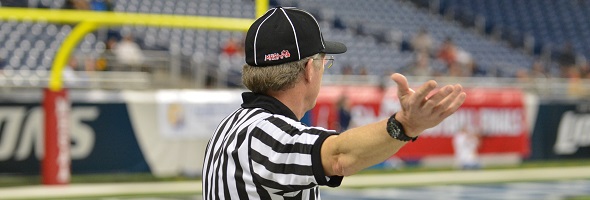
Be the Referee: Ball Hits Soccer Referee
October 1, 2020
This week, MHSAA Assistant Director Brent Rice explains a a change in soccer rules for when a ball makes contact with an official during game play.
Be The Referee is a series of short messages designed to help educate people on the rules of different sports, to help them better understand the art of officiating, and to recruit officials.
Below is this week's segment - Ball Hits Soccer Referee - Listen
We’ve all seen it before in a soccer game. A ball is kicked up the field, but ricochets off an official and leads to a goal scoring opportunity.
In the past, an official would swing his arms to indicate “play on.” A new rule, though, would stop play immediately and restart with a Drop Ball.
New in high school soccer for the 2020-21 school year, when a ball touches the referee which leads to a promising attack, the referee must blow his whistle to stop play and start with a Drop Ball. He should ALSO give a Drop Ball in two other instances: when the ball hits the official and possession changes or when a ball hits the official and goes into the goal.
Past editions
9/24: Clocking the Ball from the Shotgun - Listen

Be the Referee: Football Overtime
October 1, 2014
This week, MHSAA assistant director Mark Uyl explains how football overtime is played at the high school level.
"Be the Referee" is designed to help educate people on the rules of different sports, to help them better understand the art of officiating and to recruit officials. The segment can be heard on Mondays, Wednesdays and Fridays during the school year on The Drive With Jack Ebling on WVFN-AM, East Lansing.
Below is this week's segment - Overtime - Listen
There is nothing better for a football fan than a close game, and the ultimate is when that close game ends up going into overtime.
The high school overtime rules are quite similar to those used at the college level. In other words, both teams are going to be guaranteed one possession of the ball starting out first down and goal to go from the 10-yard line. A couple of key differences are if the defense gets possession of the ball on an interception or on a fumble, the ball is dead and the teams switch offense and defense, In other words, that ball can’t be returned for a defensive score to end the game.
There is also no requirement that the offense at any point after a touchdown be required to go for two (points). If the game would go seven or eight overtimes, teams can continue to simply kick the one point extra point.
Past editions
Aug. 25 - Targeting - Listen
Sept. 4 - Concussions - Listen
Sept. 11 - Pass Interference - Listen
Sept. 18 - Tackle Box - Listen
Sept. 25 - Field Goals - Listen

